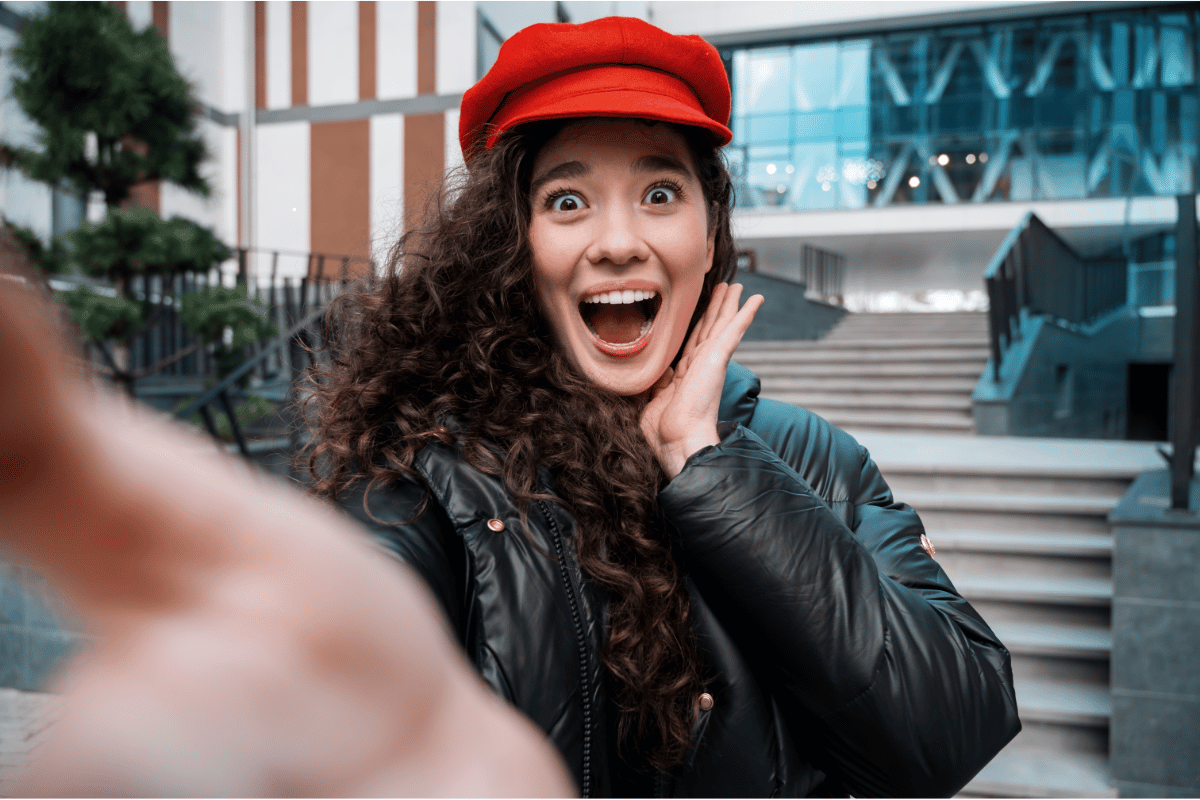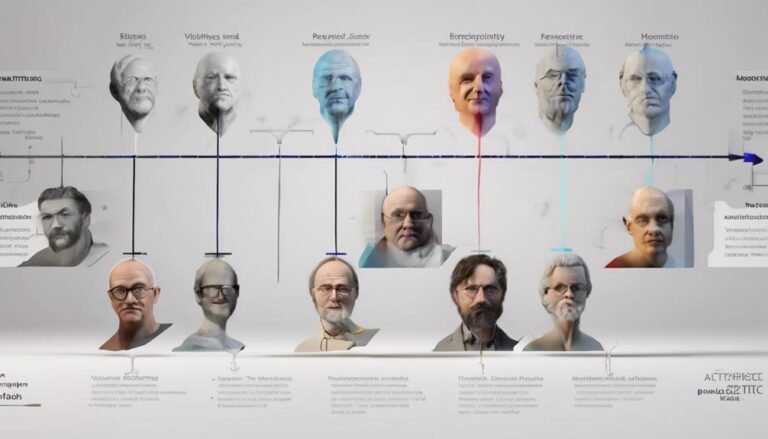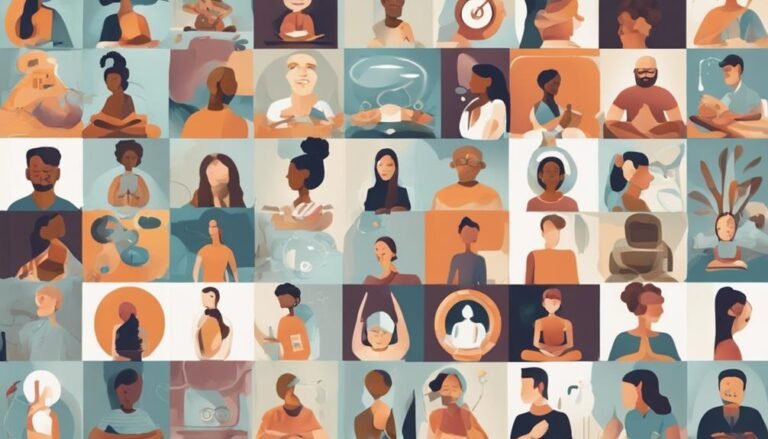The Influence of Social Media on Personality Development
Imagine social media as a mirror reflecting back different versions of yourself, each carefully crafted by filters and captions. You scroll through countless profiles, absorbing snippets of lives that seem flawless and effortless. But have you ever stopped to think about how this constant comparison game might be shaping your own personality? The impact of social media on your self-image goes beyond mere likes and comments; it seeps into the very core of your identity, influencing how you perceive yourself and others. But what happens when the curated personas online blur the lines between reality and facade?
Key Takeaways
- Social media shapes self-image and self-esteem through curated posts.
- Exposure to unrealistic standards leads to comparison traps.
- Identity formation is influenced by social media interactions.
- Authentic self-exploration is hindered by pressure to conform.
- Self-worth assessment can be distorted by social media’s influence.
Impact of Social Media on Self-Perception
Social media platforms greatly influence how individuals perceive themselves, shaping their self-image and self-esteem. The constant exposure to carefully curated posts and profiles on social media can lead to a comparison trap, where individuals start to assess their own self-worth based on unrealistic standards set by others. This phenomenon often hinders genuine self-reflection and fosters a skewed perception of reality.
Moreover, identity formation, an important aspect of personal development, can be greatly impacted by social media. The pressure to fit in or conform to certain ideals portrayed online can hinder individuals from exploring their authentic selves and embracing their uniqueness. This can lead to a lack of confidence in one’s identity and a constant need for external validation.
Influence on Communication Skills
When engaging with others on social media platforms, your written communication skills become essential as they shape how you’re perceived.
The impact of online interactions on communication skills is significant, influencing everything from the tone you use to how you interpret nonverbal cues in a digital environment.
Understanding these dynamics can help you navigate social media interactions more effectively and develop stronger communication skills both online and offline.
Social Media and Speech
Engaging with social media platforms can greatly impact your communication skills, shaping how you express yourself both online and offline. In the digital age, understanding technology etiquette is essential for maintaining a positive online presence and fostering healthy digital communication.
Social media plays a significant role in how we communicate, influencing our speech patterns and language use. It provides a platform for individuals to express themselves, but it also introduces challenges such as cyberbullying. Being mindful of cyberbullying prevention strategies is important to guarantee that online interactions remain respectful and constructive.
Moreover, the informal nature of social media communication can sometimes blur the lines between online and offline speech. This can affect how individuals articulate their thoughts and interact with others in face-to-face conversations. Developing strong communication skills in both digital and real-world settings is crucial for navigating the complexities of modern social interactions.
Online Interactions Impact
Interactions conducted online have a profound impact on an individual’s development of effective communication skills. Engaging in online friendships allows individuals to practice empathy, active listening, and conflict resolution in a digital environment. These interactions contribute to the enhancement of one’s ability to express thoughts and emotions clearly and respectfully. Moreover, the cultivation of online friendships can lead to the formation of strong social bonds, fostering a sense of belonging and support.
| Online Friendships | Digital Identity |
|---|---|
| Practice empathy | Shape self-perception |
| Develop active listening | Influence online behavior |
| Enhance conflict resolution | Impact real-world relationships |
Furthermore, the maintenance of a digital identity through online interactions shapes how individuals present themselves and communicate in various virtual settings. Crafting a digital identity involves self-reflection and awareness of how one’s online presence influences communication styles. Understanding the impact of online interactions on communication skills is essential for individuals to navigate both virtual and real-world relationships effectively.
Nonverbal Cues Understanding
Understanding nonverbal cues plays a significant role in shaping your communication skills, both online and offline. Nonverbal cues interpretation and body language are vital components of effective communication.
Here are four key points on how nonverbal cues understanding influences your communication skills:
- Enhanced Emotional Intelligence: Proficiency in interpreting facial expressions can lead to improved emotional intelligence. By understanding subtle cues like micro-expressions, you can better grasp others’ feelings and respond appropriately.
- Improved Relationship Building: Being adept at reading nonverbal cues allows you to establish stronger connections with others. It helps in building trust, showing empathy, and enhancing overall communication dynamics.
- Conflict Resolution: Understanding body language can aid in resolving conflicts more effectively. By recognizing defensive postures or signs of discomfort, you can address issues before they escalate.
- Online Communication: Even in the digital world, nonverbal cues play a role. Emoticons, punctuation, and typing speed can all convey nonverbal information, impacting the tone and effectiveness of your online interactions.
Role in Shaping Values and Beliefs
Social media platforms play a significant role in molding individuals’ values and beliefs by exposing them to diverse perspectives and ideologies. Through the constant stream of content, users are exposed to various viewpoints that can influence their moral compass development and belief system formation. As individuals engage with different ideas and discussions online, their values are reinforced, and they are prompted to explore ethical dilemmas they may not have encountered otherwise.
| Role of Social Media in Shaping Values and Beliefs | Examples |
|---|---|
| Exposing users to diverse perspectives | Following pages with differing opinions |
| Reinforcing personal values | Engaging with like-minded communities |
| Prompting ethical dilemmas exploration | Participating in online debates |
This exposure to a wide range of values and beliefs on social media can lead individuals to critically analyze their own convictions and consider alternative viewpoints, ultimately contributing to the development and evolution of their belief systems.
Effects on Self-Esteem and Body Image
Social media platforms heavily influence your perception of body image, often promoting unrealistic beauty standards that can lead to decreased self-esteem. Constant exposure to carefully curated images and lifestyles may contribute to feelings of inadequacy and self-doubt, impacting your overall confidence and self-worth.
Understanding how social media can shape your self-esteem and body image is vital in developing a healthy relationship with these platforms.
Body Image Impact
The portrayal of idealized body images on social media platforms can greatly impact an individual’s self-esteem and body image perception. Constant exposure to unrealistic beauty standards and comparison with curated online personas can lead to feelings of inadequacy and dissatisfaction with one’s own body.
Here are some key points to take into account:
- Body Positivity: Social media can promote body positivity movements, encouraging self-love and acceptance regardless of societal norms.
- Social Comparison: Individuals often compare themselves to influencers and celebrities on social media, which can trigger negative self-perception and body image issues.
- Media Literacy: Developing media literacy skills is essential in understanding how images are manipulated and curated on social platforms, helping individuals differentiate between reality and fiction.
- Self-Acceptance: Cultivating self-acceptance and focusing on personal strengths rather than external appearances can help combat the negative impact of idealized body images on social media.
Self-Esteem Influence
Exposure to idealized body images on social media platforms can greatly influence individuals’ self-esteem and perception of their own bodies. Constant comparison to flawless images can lead to feelings of inadequacy and lower self-esteem. Additionally, the quest for online validation through likes and comments on appearance-related posts can further exacerbate these negative feelings. Research suggests that individuals who spend more time on social media tend to have lower self-esteem and body satisfaction due to the unrealistic beauty standards portrayed online.
| Negative Effects of Social Media on Self-Esteem |
|---|
| 1. Increased feelings of inadequacy |
| 2. Lower self-esteem and body satisfaction |
| 3. Seeking validation through online interactions |
To combat these detrimental effects, it is essential to promote body positivity and self-acceptance. Encouraging realistic representations of beauty and worth beyond physical appearance can help individuals develop a healthier self-esteem. Seeking validation from within rather than solely relying on online feedback is important for fostering a positive self-image.
Impact on Social Interactions and Relationships
Engagement on social media platforms greatly influences the quality and dynamics of personal interactions and relationships. The impact of social media on social interactions and relationships can be significant.
Here are some key aspects to keep in mind:
- Privacy Boundaries: Social media blurs the line between public and private life, affecting how individuals establish and maintain personal boundaries. This can lead to challenges in maintaining intimacy and trust in relationships.
- Emotional Intelligence: Constant exposure to curated online personas can skew perceptions of real-life interactions, potentially affecting one’s emotional intelligence. This may result in difficulties in understanding and managing emotions effectively in face-to-face encounters.
- Communication Skills: The reliance on digital communication can hinder the development of essential communication skills, such as active listening and non-verbal cues, which are important for fostering meaningful relationships.
- Relationship Maintenance: While social media allows for easy connection, it can also create a false sense of closeness that may undermine the effort required to nurture and sustain genuine relationships offline.
Connection Between Social Media and Mental Health
Social media’s influence extends beyond social interactions, impacting mental health through various mechanisms that warrant examination and consideration.
The implications on mental health are significant, particularly concerning peer and social comparisons. Constant exposure to curated and often idealized versions of others’ lives on social media platforms can lead to detrimental effects on emotional well-being. Individuals may experience feelings of inadequacy, jealousy, and low self-esteem when comparing their own lives to the seemingly perfect lives portrayed online.
This social comparison can contribute to increased levels of anxiety, depression, and overall dissatisfaction with one’s own life. Research suggests that the more time individuals spend on social media engaging in these comparisons, the higher the likelihood of experiencing negative mental health outcomes.
It’s essential for individuals to be mindful of their social media usage and the impact it may have on their mental well-being. Developing strategies to limit exposure to harmful comparisons and promoting a more balanced and realistic view of social media content can help mitigate these negative effects on mental health.
Influence on Behavior and Decision-Making
Individuals often find that their decisions and behaviors are greatly influenced by the content and interactions they encounter on social media platforms. The constant exposure to various stimuli on these platforms can have a substantial impact on how you behave and make decisions in your daily life.
Here are some ways social media can influence your behavior and decision-making:
- Impulsive Decisions: The instant gratification culture on social media can lead to impulsive decision-making tendencies, where you may act quickly without fully considering the consequences.
- Peer Pressure: Social media platforms often create an environment where individuals feel pressured to conform to certain behaviors or lifestyles to fit in or gain approval from their peers.
- Emotional Responses: Engaging with emotionally charged content on social media can trigger strong emotional responses, affecting your mood and decision-making abilities.
- Social Comparison: Constant exposure to curated and often idealized versions of others’ lives on social media can lead to unhealthy social comparisons, influencing your behaviors and choices.
Being aware of how social media can impact your behavior and decision-making is essential in maintaining a healthy relationship with these platforms.
Conclusion
As you reflect on the influence of social media on your personality development, consider the significant impact it has on how you perceive yourself, communicate with others, and navigate relationships.
The complexities of social media’s role in shaping your values, beliefs, and behaviors are vast and multi-faceted. It’s essential to continue exploring the nuanced effects of social media on your mental health, self-esteem, and decision-making processes to understand the full extent of its influence on your life.







